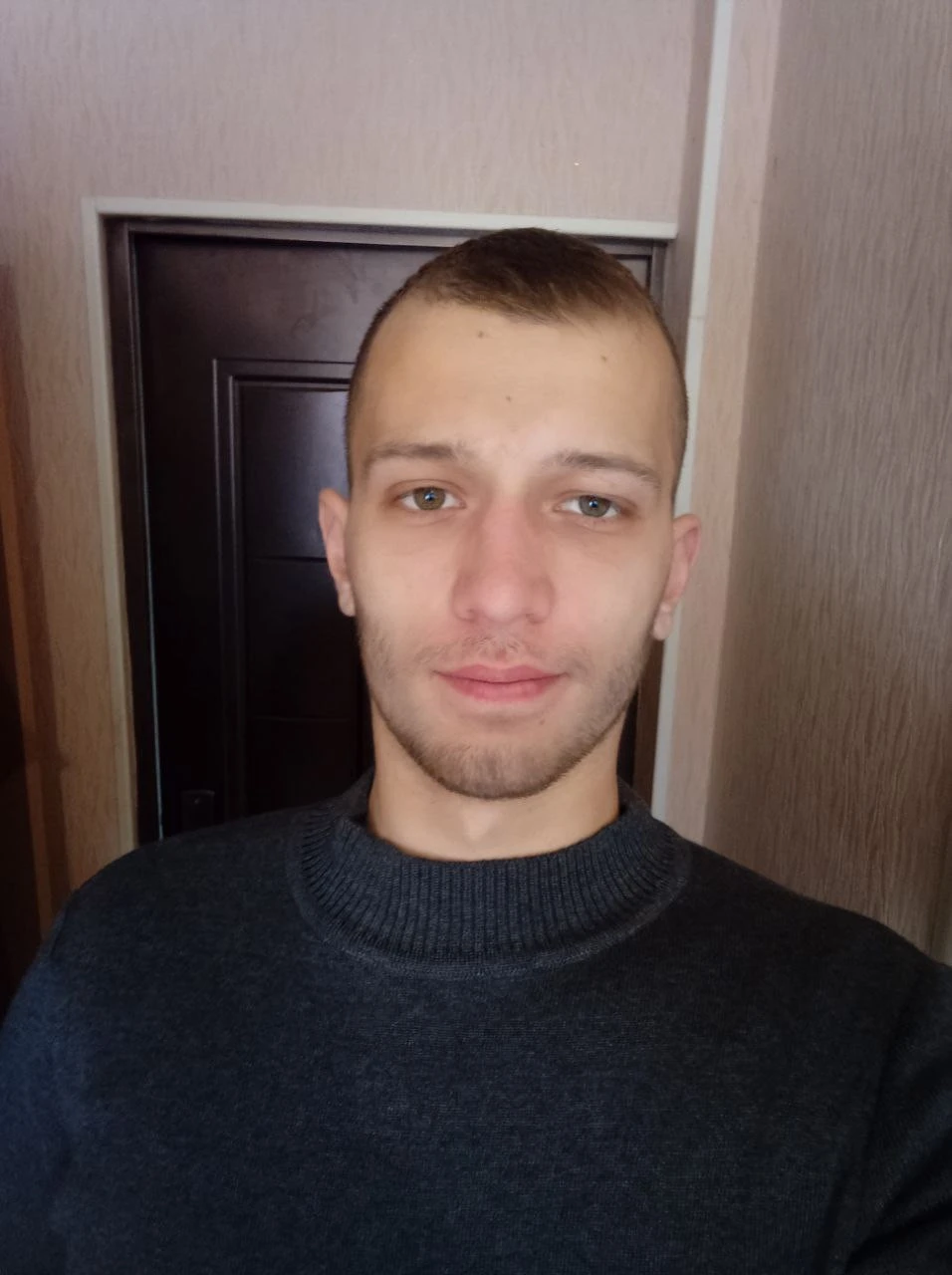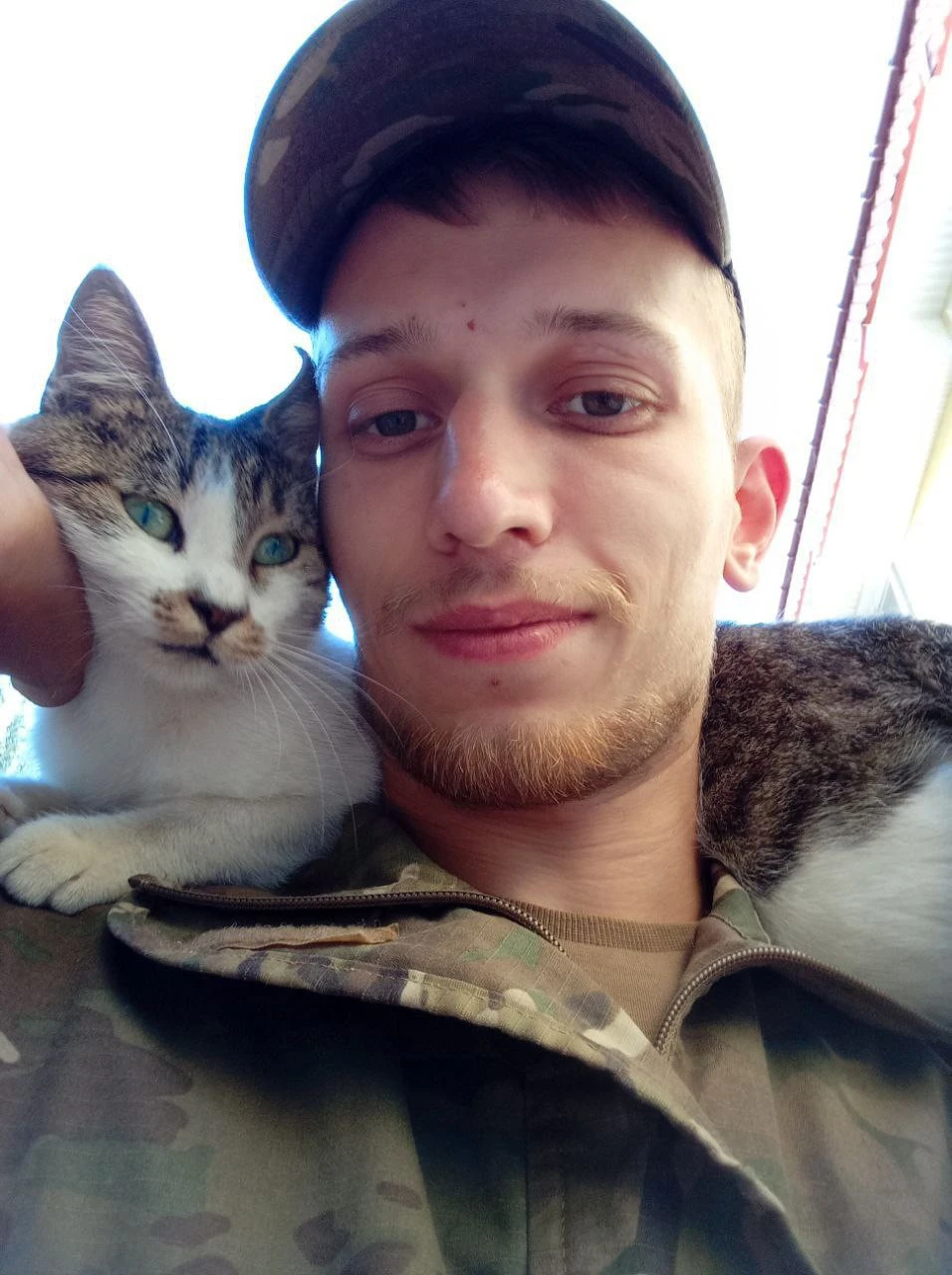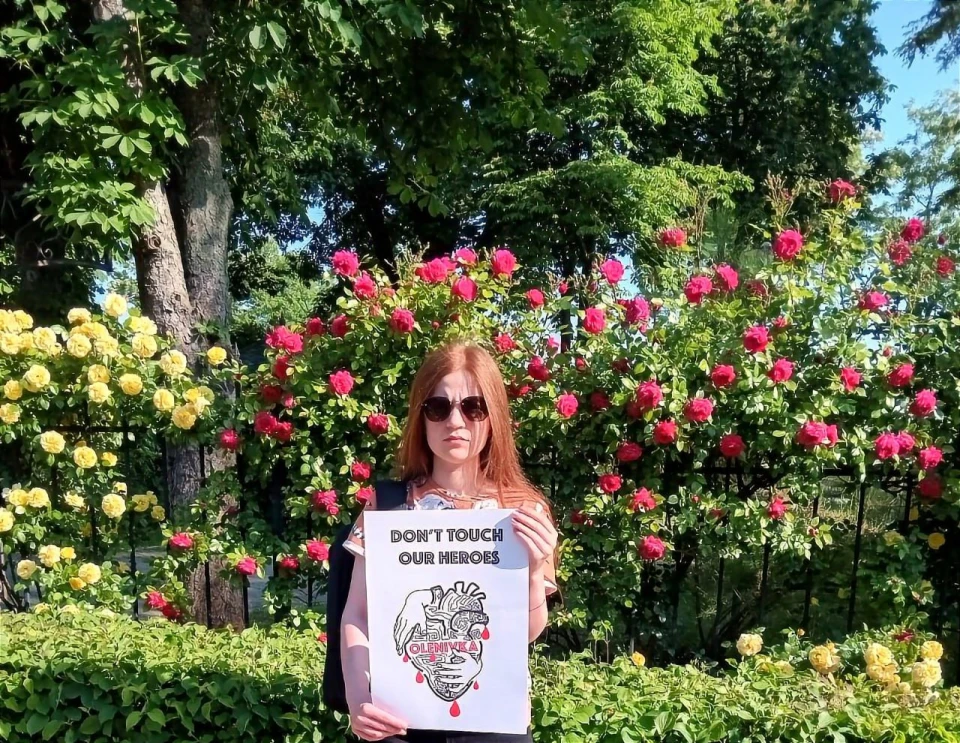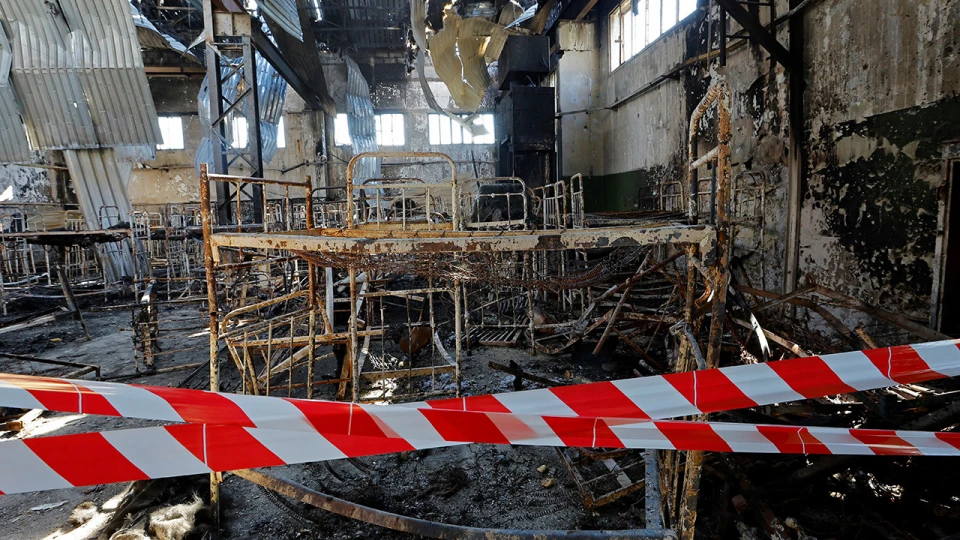
"We were silenced, then a terrorist attack hit Olenivka." Wife of Azov soldier talks about investigation of Olenivka tragedy caused by Russians
It's been over a year since the defenders of Mariupol left Azovstal and the terrorist attack occurred in Olenivka. The international investigation did not work out because Russia denied access to the tragedy site. In Ukraine, the progress was slow until recently. Maria Alekseyevych, the wife of the captive Azov soldier Serhiy, shared her story. She last saw her husband in a Russian video after the terrorist attack. Read on Espreso about how Olenivka prisoners' families are seeking truth and trying to bring their loved ones home
From love to captivity, this is the story of Serhiy Alekseyevych, a soldier from the Azov regiment
Back in 2018, they connected on social media. Both were studying psychology in Khmelnytskyi. Maria liked the subject, but she wasn't too keen on pursuing it as a career. On the other hand, Serhiy was deeply passionate about his future profession. He bought books, listened to lectures, and worked on improving himself, aiming to become a licensed psychologist. He also had an interest in IT and programming, helping Maria learn this new field, which she now works in. She says he was always encouraging, assisting, and motivating her to try new things.

Their plans included marriage, starting a family, and having kids. They even picked out cities where they would live together. However, everything changed on February 24 when Russia declared war on Ukraine, and Serhiy joined the Azov regiment as one of the defenders of Mariupol.
"On the evening of February 24, Serhiy messaged me that he was okay and told me to focus on learning programming. I couldn't really teach at that moment, even though I wanted to. It was the first day of the big attack. I didn't know where he was or how he was really doing, despite his messages. It was really stressful. I just couldn't predict what would happen next," she said.
While Serhiy was in Mariupol fighting, they stayed connected. His last message to Maria was on May 13, just three days before leaving Azovstal.
"He never mentioned planning to leave Azovstal. He didn't even hint at it as a possibility. He simply said he loved me and not to worry if he couldn't stay in touch for a while. It was a brief exchange. I told him I loved him too and would wait, but he didn't get to read it," she recalls.
Serhiy Alekseyevych, along with over 2,000 fellow defenders, left the Azovstal plant, surrendering to the Russians. They were taken to Olenivka. Since then, Maria, like other Ukrainians with captured relatives, constantly keeps an eye on Russian news, hoping against hope to catch a glimpse of her loved one's face and ensure he's alive.
After leaving Azovstal, Maria saw Serhiy in videos filmed by the Russians three times. The first was on May 19 when captors showed the prisoners' conditions in Olenivka. Then, in another video, Serhiy appeared unintentionally. These videos were short, but even in those few seconds, Maria could always spot Serhiy. She saw her husband for the third and final time after the Olenivka Colony tragedy.
“Following the attack in Olenivka, the Russians released lists on July 30. I found Serhiy's name among the wounded. Initially, they advised not to trust this information, claiming it wasn't true. I also had doubts, as it seemed like a Russian trick, perhaps meant to frighten us. I thought maybe it wasn't real, that everyone was fine. However, on August 3 of last year, I watched a short video from a Donetsk hospital. There was Serhiy, wounded in the ward. He talked about what he had experienced. I haven't been in touch with him since. I don't know which prison he's in or how he's doing,” Maria said.
In general, Serhiy, according to his wife, is very caring and sensitive. He was kind to animals, often helping them during walks. Once, he even rescued a kitten from the street and brought it home. That cat still lives with Maria. He was always eager to grow personally, and he supported his beloved in her endeavors too. Even during the intense battles in Mariupol, he managed to uplift Maria's spirits.

"Despite being in the midst of war, surrounded by the enemy, Serhiy did his best to keep my spirits up. He supported me in every way, checking if I had enough, if I was safe, and if everything was alright. He always reassured me and encouraged me to stay strong," she said.
Serhiy never shared details about the war with Maria. He wanted to shield her from the horrors he faced. When she asked, he changed the topic. Now, she appreciates his care, knowing that if she had known everything back then, she might not have coped.
Serhiy is from Khmelnytskyi, and Maria from Khmelnytskyi region. Before the full-scale invasion, they discussed living in a village for a peaceful life, as he was tired of city living. At first, Maria wasn't keen on the idea. But now, with Serhiy in Russian captivity for over a year, she wishes to move to a calm place, to build a serene life together.
"In the summer of 2021, we debated moving to Mariupol. For three months, we considered how to do it right. Then Serhiy said, 'Wait until...' He didn't explain. I think he had a feeling. When we talked about a possible invasion, he predicted heavy fighting in Mariupol. He decided he would go there as soon as the Russians approached, regardless of when. He wanted to defend Ukraine and secure a better future, hoping our children wouldn't have to fight the Russians," Maria said.
Investigation of Olenivka tragedy and the Olenivka Prisoners of War Family Community
The attack in Olenivka happened on July 29. Over 50 Ukrainian prisoners of war were killed, and more than 130 defenders were injured. One of them is Serhiy Alekseyevych. Following this tragedy, the United Nations formed a group to look into what happened in the colony located in the occupied Donetsk region. However, the Russian authorities didn't allow any international representatives to visit the site of the attack. Because of this, the United Nations ended the group's work in January 2023. Then, the families of the victims of the Olenivka terrorist attack decided to create their own community. Their aim was to independently uncover the truth about how Ukrainian prisoners of war were killed by the Russians.
"We have three main goals: to bring back the wounded prisoners of war from the attack, to remember those who died as a result of the attack - to make sure people know their names and stories. These people followed orders and were promised they would be safe after leaving Azovstal, but sadly, they won't be able to see their families again. And the third goal is to restart the international investigation," Maria explained.

Notably, a month ago, they started a petition requesting official days of mourning and remembrance for the defenders executed in Olenivka. This is important for the families of the war prisoners killed by the Russians. The collection of signatures is ongoing. As of August 13, around 13,500 Ukrainians have supported the petition out of the needed 25,000. To assist the Olenivka Family Community, you can follow the link to vote.
Initially, the community only included the families of fighters who were injured in Olenivka. Later, the families of fallen soldiers joined because they also needed help. They have a lot of valuable information that's crucial for finding out the truth.
Currently, there are 140 people in the Olenivka Family Community. However, this is just a fraction of the relatives of Mariupol's defenders who were involved in the Olenivka incident. Many relatives can't be located because not all of them, including the wounded, were listed by the Russians. While more than 130 Ukrainian defenders were injured on the night of July 29 in Olenivka colony, Russia only published a list of 73 people. So, it's likely that those with minor injuries who weren't hospitalized weren't mentioned, explains Maria. They are still searching for these individuals.
"When we started our work, we found out that the investigation wasn't done properly in Ukraine either. Witnesses of the attack who were in the barracks or knew important information weren't interviewed back then. It seems they were only questioned a month or so ago. We even wrote to the deputies about this, and they helped us move the case forward. In Ukraine, the Security Service and the Prosecutor General's Office are investigating the Olenivka attack. However, the SBU only focuses on the deceased; they don't have information about the injured. Now, after multiple meetings, the Prosecutor General's Office assured us that they will look into the cases of the injured. Whether they will continue the investigation remains uncertain for now," she says.
The Olenivka Family Community also regularly meets with the coordination headquarters for the treatment of prisoners of war, especially regarding the return of the wounded from the attack. However, Maria points out that only consultants come to their meetings. The top management of the headquarters, including the secretary Dmytro Usov, doesn't attend due to supposed lack of time.
“We often say that we're ready to work together, open to different ideas, and can assist in various ways. For example, we can join meetings to talk about the injured or prisoners. We've asked multiple times to meet with Dmytro Usov, who's involved in swapping prisoners, but sadly, he hasn't met with us. He mentions he's busy and then we see photos on the coordination headquarters' pages showing him meeting with families from other brigades,” she explains.
The Olenivka Family Community also wanted to talk to the President's Office about the attack in Olenivka and prisoner exchanges, but they were turned down. The President's Office doesn't meet with citizens during times of military rule, they explained.
Meanwhile, Dmytro Lubinets, the human rights representative in the Ukrainian Parliament, has been actively helping families of Ukrainian soldiers captured or killed in Olenivka. With his help, two big meetings happened. People from the Security Service of Ukraine, Prosecutor General's Office, coordination headquarters, Red Cross Committee, and the United Nations joined in.
"Do these meetings achieve anything? If we talk about the investigation, then yes. In April, we met with Dmytro Lubinets to speed up DNA tests for those who died in the Olenivka attack. Until April, very few bodies were identified, even though they were brought back in October 2022. Families didn't know why it took so long. They hoped their loved ones were prisoners, but waiting made things worse. After that meeting, the tests got faster, and now almost all bodies are identified – officially 52 people, 5 or 7 left."
For prisoner exchange, not much has changed. Last time, 22 returned, and in a year, around 500 were exchanged. Yet, Maria mentions that about 2,500 left Azovstal alone, including 700 from Azov.
Maria believes that we shouldn't stay quiet about those who are taken by the Russians. It's important to always talk about and share information about what happened in Olenivka and about each Ukrainian fighter who got caught there. Over a year ago, the authorities asked to stay silent about the defenders of Mariupol who withdrew from Azovstal, to not harm the prisoners of war. However, after a terrorist attack happened in the prison, Maria regretted staying quiet for so long. She didn't know what to do back then.

"After the attack, they told us that negotiations were ongoing, a complex process, and there would be good news soon. They said not to talk anywhere, keep silent. We waited, but now it's been more than 15 months since they were captured. Talking about prisoners of war is a personal choice. Everyone listens to their heart, intuition, deciding if speaking out could harm or help them come back sooner. I have a strong belief that talking about it will bring Serhiy back alive," she noted.
We only know a few defenders; we've seen the ones who returned. We don't know what happened to the others. So, it's important to talk about each defender, to show their faces. This wasn't a battlefield capture but a planned exit from Azovstal, so the country's leaders should take responsibility for these people because there were promises that everything would be okay.
"After four months in captivity, 215 people were exchanged (this was in September 2022). The rest are still with the Russians, including the injured. I think their injuries and wounds are getting worse. It's common knowledge that our soldiers are still dying in captivity. That's why the Ministry of Foreign Affairs needs to focus on the international stage. There are ways to influence this situation, as shown by the exchange last September. The question is how these tools are used and if they're even being used at all," Maria said.
-
July 29 marked one year since the tragedy in Olenivka when the Russians killed over 50 Ukrainian prisoners of war and left more than 130 defenders injured and wounded. You can learn about the events on that night in the prison located in the occupied Donetsk region, read about the soldiers who managed to escape from Olenivka captivity, and get updates on the investigation of this Russian crime in our article.
- News













































